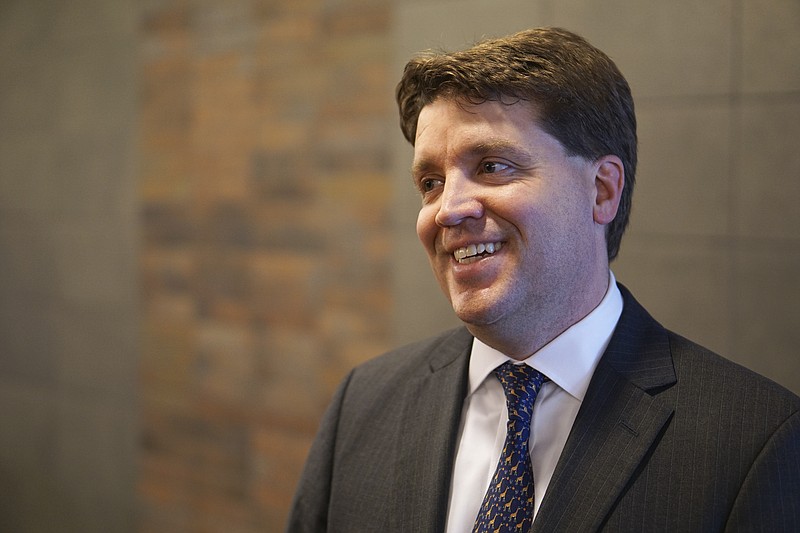Tennessee's biggest health insurer is preparing to ask for additional rate increases next year comparable to the 36.3 percent jump in premiums charged this year on its ObamaCare health exchange plans.
BlueCross BlueShield of Tennessee estimates it will end up losing more than $150 million on its health exchange plans offered in 2015, company CEO J.D. Hickey said Thursday.
"We are not out of the woods yet and as we look out on 2016, we believe that no Tennessee insurance carriers will make any money on this market and, in fact, we're all going to lose a substantial amount of money," Hickey told the Chattanooga Rotary Club. "As a result, we've already told the Department of Commerce and Insurance in Nashville that we are going to need at least one more rate increase on the order of magnitude of what it was last year."
BlueCross must submit its preliminary rate requests to state regulators for 2017 premiums by May. Any rate increase must to approved by the Tennessee Department of Commerce and Insurance after reviewing claims and financial data submitted by health insurers across the state.
But Tennessee's insurance commissioner, Julie Mix McPeak, told a Tennessee Senate Committee hearing last week that consumers should expect another year of double-digit rate hikes.
"I do fully expect that we should prepare ourselves for rate increases of the same magnitude next year as we experienced in 2016," she said.
Last year, state regulators approved rate increases in the health exchange markets of 44.7 percent for Community Health Alliance before it shut down, 36.3 percent for BlueCross and 5.8 percent for Humana.
Hickey said BlueCross overall made money in 2015 from all of its plans, but commercial insurance plans can't be used to subsidize underfunded health exchange plans.
"If the plans continue to lose money this year and they want to continue to participate in 2017, they are going to have to raise their premiums by a fairly significant amount," Chris Rigg, senior managed care and health care services research analyst at Susquehanna International Group, told a Nashville health forum earlier this month.
UnitedHealth entered the Tennessee market this year, but the company said losses in Obamacare policies could lead the company to give up health exchange coverage to limit its losses.
"We're a little bit more optimistic," Hickey said.
After another year or two of rate increases, the market should stabilize, especially if the adverse selection of primarily sick persons signing up is replaced with a broader population and wellness programs begin to take hold on costs.
Tennessee's BlueCross plan, which had about 80 percent of the individual ObamaCare market in the state when it offered some of the lowest rates in the country for such plans, lost $141 million in the first year of the ObamaCare program. In response to such losses, BlueCross requested and got approval last year for one of the bigger rate increases for a major carrier anywhere in the country.
Even with the 36.3 pecent average jump in BlueCross rates, however, Tennessee rates for a typical 27-year-old with the most popular plan are still below the U.S. and Southeastern average, ranking 15th lowest among the states. In the first year of the program in 2014, Tennessee BlueCross rates were second lowest and last year they were still the 5th lowest among all states.
"We've been catching up from previous years when we quite frankly underpriced the product not knowing who was going to sign up and how the plans would work out," Hickey said. "How did we get in wrong as an industry? We were overly optimistic, but the federal government also kept changing the rules and allowing people to sign up when they get sick and not paying the penalties for not signing up."
Hickey said ObamaCare has made health insurance available for more than 16 million more Americans "and that's a great thing."
But federal taxpayers and many of those insured have had to pay more to expand Medicaid, keep children of those insured with coverage until age 26, provide subsidies for individual plans for low- and middle-income families or pay tax penalties on those who don't buy insurance.
Hickey said the average unsubsidized premium for most health exchange plans by BlueCross is $463 a month, but the average member after tax subsidies pays only $158 a month.
The biggest increase in the number of insured persons under ObamaCare has come from the expansion of Medicaid benefits for those above the poverty line. But Tennessee is one of 20 states that opted not to expand Medicaid coverage.
Contact Dave Flessner at dflessner@timesfree press.com or 423-757-6340.
